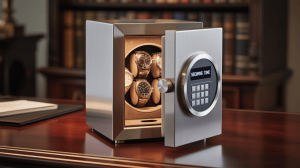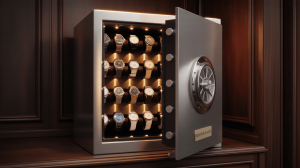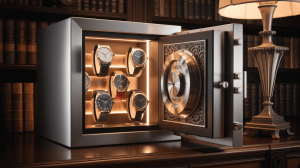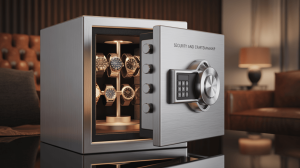Every serious watch collector knows the importance of keeping automatics wound and secure. A home safe with an integrated watch winder offers both. It locks away valuable timepieces behind reinforced steel. It also keeps them running, preserving accuracy. This single solution prevents damage from inactivity and theft. It transforms how you store and care for your collection.
1. Understanding the Value of Automatic Watches
Automatic watches rely on wrist movement. Without motion, lubricants settle and accuracy drifts. Over time, this can require costly servicing. By keeping watches rotating daily, you preserve movement integrity. Each time you open the safe, you find a watch ready to wear. This routine care extends each timepiece’s lifespan.
2. The Risks of Storing Watches Improperly
Leaving automatics static invites problems. Lubricants can thicken, causing friction. Moisture and dust can settle into exposed movements. The crown and stem may suffer manual winding damage. If you swap straps often, you risk scratches. A combined safe prevents these risks by offering a controlled environment and precise winding.
3. Security Advantages of a Home Safe with Winder
A dedicated home safe provides vault-grade protection. Thick steel walls and multi-point locking bolts resist pry bars and drills. Many models meet UL RSC burglary standards. Fireboard insulation and intumescent seals achieve UL 72 Class 350 fire ratings, protecting contents from 1,200°F for 30 minutes. Biometric or electronic locks grant personalized access. Bolting to floor joists or wall studs prevents removal.
| Security Feature | Specification | Benefit |
|---|---|---|
| Steel Gauge | 12–14 gauge | Resists forced entry |
| Fire Rating | UL 72 Class 350 | Protects against extreme heat |
| Lock Type | Biometric/Electronic | Personalized, tamper-resistant |
4. Preventing Lubricant Congealation
When automatics sit idle, oils can separate. This separation causes uneven lubrication. Over time, components wear faster. A watch winder simulates wrist motion, keeping lubrication balanced. Your watches maintain consistent performance. You avoid sudden accuracy shifts and extra servicing costs.
5. Eliminating Manual Winding Hassles
Manual winding every few days becomes tedious. You must reset date and time for complex models. If you forget, complications stop working. A built-in winder automates this process. It rotates watches on precise turns-per-day (TPD) cycles. You wake up to a fully wound watch. No resets, no hassle.
6. Maintaining Accuracy and Convenience
High-precision movements need exact winding profiles. Premium winders let you set TPD from 650 to 2,000. You choose clockwise, counterclockwise, or bi-directional rotation. Pause intervals prevent over-winding. Japanese or Swiss motors run below 25 dB. Rubber-damped mounts reduce vibration. This quiet operation ensures watches remain accurate and ready at a moment’s notice.
| Winding Specification | Range/Option | Advantage |
|---|---|---|
| Turns-Per-Day (TPD) | 650–2,000 | Matches manufacturer requirements |
| Direction Control | CW/CCW/Bi-directional | Prevents winding stress |
| Noise Level | < 25 dB | Suitable for bedrooms/offices |
7. Protecting Against Humidity and Dust
Humidity damages leather straps and metal cases. Dust particles can settle into open movements. Many safes include passive desiccant chambers. Some add active dehumidifiers and IP54-rated door seals. Digital hygrometers display real-time humidity levels. Maintaining 40–50% RH guards against corrosion and strap cracking.
8. Combining Organization with Security
Integrated safes feature padded drawers and modular trays. Velvet-lined compartments hold rings and cufflinks. Necklace hooks prevent tangles. Foam watch pillows cradle timepieces securely. Hidden drawers can store paperwork or extra straps. This layout keeps everything orderly and protected within one vault.
9. Silent and Vibration-Free Operation
Quality winding motors rest on rubber-damped mounts. Precision bearings keep noise under 25 dB—about as loud as a whisper. Soft-close hinges eliminate slamming sounds. Silent locking bolts reduce clicking. Even in a quiet bedroom or home office, the safe operates discreetly. Watches wind without disturbing sleep or concentration.
| Component | Specification | User Benefit |
|---|---|---|
| Motor Mounts | Rubber-dampened | Minimizes mechanical vibration |
| Bearings | High-precision | Keeps noise under 25 dB |
10. Customizing Winding Profiles per Watch
Each watch brand has unique winding requirements. Rolex models often need 650 TPD. Patek complications may require 1,200 TPD. Top safes let you program individual winding profiles. You adjust direction and pause intervals. This precision ensures each caliber stays properly wound without stress.
11. Aesthetic Integration into Home Decor
A home safe with a winder should complement your interior. Options include matte-black powder-coat, walnut veneer, or leather trim. Flush-mount keypads and beveled glass panels add a gallery feel. Motion-activated LED lighting showcases watches and jewelry. The safe becomes a decorative piece rather than just a functional box.
12. Smart Connectivity and Remote Monitoring
Modern safes integrate Bluetooth or Wi-Fi. You receive tamper and door-open alerts on your phone. Low-battery and humidity notifications keep you informed. A mobile app allows remote lock/unlock and winding schedule adjustments. Audit logs record every access event. This connectivity brings enterprise-grade oversight to your home.
| Smart Feature | Functionality | Advantage |
|---|---|---|
| Mobile Alerts | Tamper/Door/Open | Instant security notifications |
| Remote Control | Lock/Wind Adjustments | Convenience from anywhere |
| Audit Logs | Access History | Full accountability |
13. Power Continuity and Emergency Access
Dual-power systems combine an AC adapter with rechargeable battery backups. If power fails, low-battery LEDs and app notifications alert you. A concealed mechanical override key or dial provides manual entry. This layered approach prevents lockouts and maintains winding functions during outages.
14. Installation and Anchoring Best Practices
Proper installation ensures maximum security. First, locate floor joists or wall studs with a stud finder. Use heavy-duty lag or sleeve anchors rated for the safe’s total weight. Level the safe before tightening anchors to prevent door binding. Conceal anchor heads beneath interior liners or trim for a clean appearance. Professional installation is recommended for larger models.
| Step | Action | Tip |
|---|---|---|
| Locate Studs/Joists | Use a stud finder | Mark points before drilling |
| Choose Anchors | Heavy-duty lag/sleeve anchors | Match anchor strength to weight |
| Level Safe | Adjust base before tightening bolts | Prevent door binding |
15. Long-Term Cost Savings and Value Retention
While hybrid safes range from $1,500 to over $10,000, they offer long-term benefits. Reduced watch servicing costs come from consistent winding. Fewer jewelry repairs result from controlled humidity. Insurance discounts often apply for certified fire and burglary protection. Over years, these savings offset the initial investment and maintain the value of your collection.
| Benefit | Immediate Cost | Long-Term Value |
|---|---|---|
| Reduced Servicing | N/A | Lower watch maintenance fees |
| Prevented Repairs | N/A | Fewer jewelry restoration costs |
| Insurance Discounts | N/A | Lower annual premiums |
FAQ
Q1: Can I store both quartz and automatic watches?
Yes. Quartz watches sit in static trays, while automatics use the winding modules.
Q2: How often should I replace desiccant packs?
Replace every 6–12 months based on local humidity to maintain ideal relative humidity.
Q3: Are smart alerts secure from hacking?
Premium models use AES encryption and require strong, unique passwords for remote access.
Q4: Do these safes require professional installation?
Recommended for heavy or built-in units to ensure proper anchoring and stability.
Q5: Can I expand capacity later?
Yes. Modular trays and drawer kits allow you to add extra winding bays or jewelry compartments over time.







